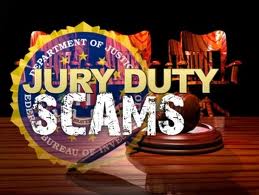JACKSON – Attorney General Jim Hood is warning Mississippi consumers about a long-standing scam related to jury duty that has recently resurfaced. Hood said the scam begins when potential victims receive a call from someone claiming to be a court officer. The caller informs the victim that he or she has failed to appear for jury duty and may even state that a warrant has been issued for his or her arrest.
“It’s easy to see why this works,” said Attorney General Hood. “The victim is clearly caught off guard and understandably upset at the possibility of being arrested.”
Hood said after alarming the victim, the caller then seeks to “confirm” the victim’s social security number and other personal information.
The victim is often told that the entire matter can be instantly dismissed by paying a fine.
“All the victim needs to do is provide a credit card or checking account routing number,” Hood said. “By the time the call ends, the scammer has all the information necessary to open lines of credit under the unsuspecting victim’s name. Often, these identity thieves are actually thousands of miles away and in other countries.”
With this scheme, Hood said criminals may simply go through the phone book hoping that sooner or later someone will provide the sensitive information they need to steal an identity.
“This scam’s simplicity could be what makes it so effective,” he said.
Hood further said the victim reacts immediately out of fear, rather than taking the time to reflect about the information being requested.
“In reality, court workers will never call you to ask for social security numbers and other private information,” Hood said. “In fact, most courts follow up via United States mail and rarely, if ever, will call prospective jurors.”
Consumers who receive such a call can verify whether they must appear for jury duty by calling their circuit and justice court clerks.
“Protecting yourself is the key. Consumers should never hand over personal information in response to an unsolicited telephone call or e-mail, no matter how legitimate it might appear,” said Hood.
The Attorney General’s Office offers the following tips to help consumers avoid becoming victims of these and other common scams:
*Never reply to a fax, email, pop-up, telephone or text message that asks for personal or financial information. Legitimate companies will not ask for this information in that format.
*Always contact the organization asking for your personal information using a telephone number you know to be correct to inquire why the information is needed. Never call or text the number left in the message, and never follow an Internet link to a site.
*Never fax or email personal or financial information. Review credit card and bank statements as soon as you receive them to determine whether there are any unauthorized charges.
*Keep your anti-virus software up to date. In addition, use a firewall, which helps to make you invisible on the Internet and blocks communication from unauthorized sources.
*Be cautious about opening attachments or downloading files from emails you receive, regardless of the sender.
Anyone who suspects they have been a victim of this scam or any other, should contact the Consumer Protection Division of the Attorney General’s Office at 1-800-281-4418.


Be the first to comment